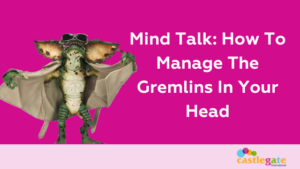“Your self-talk is the channel of behavior change.” ― Gino Norris

The voice in your head, and we all have one, is your constant companion. There’s no escaping it, and our conscious and unconscious thoughts even show up in the form of dreams when we’re sleeping.
This 24/7 narrative is bound to have its ups and downs, but if constant self-doubt and being told you’re not good enough is crippling you, it’s time to learn to manage these gremlins in your head.
Most experts say negative self-talk comes from a fear of failure and that it’s a method of protecting ourselves from a disappointing result. The problem is, giving up before you even try might mean you don’t fail, but it also means you can’t succeed. Everyone is prone to moments of self-doubt, but when these moments continuously overpower positive thinking, the gremlins in your head are getting the best of you.
If you find that you are often talking yourself out of things before you complete them, the gremlins in your head could be drowning out your inner coach and interfering with a successful personal and professional life.
The voice in your head can be your biggest supporter or your harshest critic, and when that voice isn’t managed appropriately, negative self-talk drowns out more positive thoughts. And positive thinking is a lot more than just “thinking happy thoughts.” It takes hard work to construct a supportive personal narrative that profoundly opposes what the gremlins have to say. Whether you’re leading a team at work, working on a project on your own, or going about your personal life, it’s essential to get a handle on your self-talk.
Here are some ways to manage the voice in your head.
Acknowledge It:
When the gremlins in your head flood all of your personal narratives with negativity, it’s important to acknowledge that they’re just that: gremlins. These negative thoughts aren’t facts. Just because your mind is telling you that you’ll fail, doesn’t mean that’s true. To conquer, or at least manage, negative self-talk, remind yourself that these are just thoughts, and allow them to come and go. By acknowledging these thoughts, you can check yourself when they run through your mind and think, “That’s a gremlin talking, it’s not a fact.”
Talk Back:
Now that you’ve acknowledged these negative thoughts for what they are, allow yourself one minute to let them all run through your head, and then write them down. Now, respond to these negative thoughts with the voice of your inner-coach.
Create a dialogue with yourself that directly contradicts what your gremlins have to say. This can take time because you’ll need to look for facts and evidence to oppose negative self-talk.
For example, the gremlin in your head may have said, “My team doesn’t respect me. I’m a failure as a leader.” A positive response to conquer that thought might be something like, “I am a strong and successful leader. I completed Project A ahead of schedule and increased revenue by 17% this year.”
Rather than meeting negative thoughts with generic or trite ones, you’ve reached the gremlins with fact-based positive thoughts that directly oppose your inner-critic.
Celebrate Your Success:
When you succeed, don’t hesitate to celebrate your hard work! We often tend to wallow in our failures, but if we don’t celebrate our successes just as vigorously, gremlins will ultimately make up more room in our minds than cheerleaders. Keep track of your past accomplishments so you have direct evidence to revert back to when you need to counter negative thinking. This way, you’ll build a stronger case for your inner coach while weakening any arguments your gremlin might make.
To master the next step in conquering the gremlins in your mind, your inner cheerleader needs to overpower your inner critic.
Starve the Gremlins:
Over time, acknowledging these gremlins and allowing them to come and go but not dominate your thought pattern will make your mind a more pleasant place to be. You’ve let these thoughts come and go, but you always meet them head-on with the voice of your inner coach. When a constant stream of negativity isn’t feeding these gremlins, they’ll begin to starve and shrink. Over time, your inner cheerleader will be the dominant source of conversation in your mind, and those gremlins will start to disappear into the background.
How do you manage your personal narrative? Do gremlins or cheerleaders dominate your self-talk? Contribute to the conversation in the comment section below!
